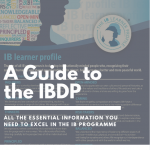The International Baccalaureate Diploma Programme (IBDP) is a pre-tertiary educational programme for students aged 16-19.
It is the equivalent qualification to the A-Levels and the AP exams, and is internationally recognised for entrance into universities worldwide.
IB students typically go through the Middle Years Programme (MYP) or equivalent form of Integrated Programme (IP) in their school, or the GCSE, IGCSE, or an internal examination before gaining entrance to IBDP.
Students taking the IBDP are required to fulfill the following:
- Six Academic Subjects:
- Every student takes 6 academic subjects, 3 at Higher and 3 at Standard level. These subjects range from Business Management, Chemistry, Mathematics, to History or even Psychology.
- Core Components:
- Extended Essay (EE): A 4,000-word independent research project that fosters critical thinking and in-depth study on a topic of your choice. Students must score a minimum grade of D in the EE component; failing which they will not be awarded the IB diploma, regardless of the student’s academic grades.
- Theory of Knowledge (TOK): A reflective course that challenges you to consider the nature and limitations of knowledge across disciplines. The TOK is an integrative study in critical thinking and allows discussion regarding the limitations of knowledge in a philosophical fashion.
- Creativity, Activity, Service (CAS): A program encouraging students to engage in creative pursuits, physical activity, and community service, ensuring personal and social development.
Diploma subjects are graded 1-7, with 7 being A* equivalent. This gives a possible score of 42 from six academic subjects, and an additional 3 bonus points for TOK and EE; the maximum possible IB score is therefore 45.
For most IB subjects, the most significant percentage of a student’s grade is derived from the final exams. However, internally assessed work or Internal Assessment (IA) still make up 15-30% of each subject’s final grade. This allows students to consistently work to improve on their coursework over the academic year.
The IBDP is widely seen as a highly challenging certification and welcomed by all international top universities for undergraduate studies. Here are some of the tips to do well in the IBDP:
1. Plan Your Subject Selection Thoughtfully
Choosing the right combination of subjects is critical. Reflect on your strengths, areas of interest, and university goals when you are planning for your subject selection. Do take note that Higher Level (HL) subjects require a greater time investment, so we would recommend you to pick the subjects which you are passionate about.
2. Set Realistic Academic Goals
Write down your long-term goals, including your dream university and intended course of study. Break these into smaller, actionable targets for each term. For instance, set a goal to achieve a specific grade in internal assessments or complete the first draft of your Extended Essay (EE) by a certain date.
3. Develop Effective Study Habits
Success in the IBDP lies in consistent hard work, effort and effective time management. Use these tips to establish productive study routines:
- Plan Your Time Ahead: Mark key dates for Internal Assessments (IAs), EE deadlines, and CAS projects on a calendar.
- Practice Past Papers: Exposure to IB-style questions builds confidence and familiarity with exam patterns.
- Use Multiple Resources: Don’t rely solely on one textbook; supplement with different guides and online resources.
4. Start Working on Core Components Early
- Extended Essay (EE): Choose a topic that interests you and is feasible to research. Familiarize yourself with your chosen subject’s guidelines to avoid pitfalls.
- Theory of Knowledge (TOK): Plan your essay and exhibition topics carefully to ensure that they align with real-world examples.
- Creativity, Activity, Service (CAS): Consistently keep track of your activities and reflections.
5. Refer to a wide range of resources
It is not advised to depend solely on one textbook, or resource. After all, IB textbooks will differ in terms of examples and structure of every topic. Worked example books are also great aid regarding Maths & Science subjects.
Often, students achieve constantly stellar marks in class but end up being disappointed by results in their mock papers and final exams. In order to tackle this, they should use a number of resources for constant brain stimulation. It cannot be stressed enough how important it is to go through past papers and try to duplicate exam conditions (time yourself, do not refer to notes). How you perform on these papers is the most accurate way of tracking your progress and predicting the final marks.
Upon completion, it is also important to be aware of the marks structure for IB exams. Get access to Mark Schemes and learn the difference between an ‘A’ mark and an ‘M’ mark. It is incredible how much the marking scheme can differ between Paper 1 and 2!
6. Plan your deadlines
Plan your internal deadlines – Achieving success in the IB is greatly dependent on one‘s study timetable. Do be mindful that the internal exams are often conducted at the same time period as the submissions for the US and UK universities. You will also find the due date for most coursework to be at the same period, which makes it challenging to meet these deadlines.
At the start of each term, it is important to mark key dates for various internal assessments and extended essays so that study targets can be consistently achieved. This ensures that there is enough time to complete the work by planning beforehand.
7. Seek Help When Needed
Your teachers and tutors are there to guide and support you, but true success in the IBDP comes from taking ownership of your learning journey. If you find yourself struggling with certain subjects or components, consider enrolling in additional support programs like those offered by Quintessential Education. Our IB tuition, led by experienced IB examiners and top IB graduates, is tailored to help you excel. In 2023, all our graduating IB students achieved scores of 6 and 7 in their exams, with a remarkable mean score of 40.7—far exceeding the national average of 37.
Final Thoughts
The IBDP is more than an academic challenge—it’s an opportunity to grow as a well-rounded individual. With thorough preparation, a structured approach, and a resilient mindset, you can navigate the program successfully. Embrace the journey, stay curious, and most importantly, enjoy the learning process!
For more technical guides and resources, download our IB Guide





